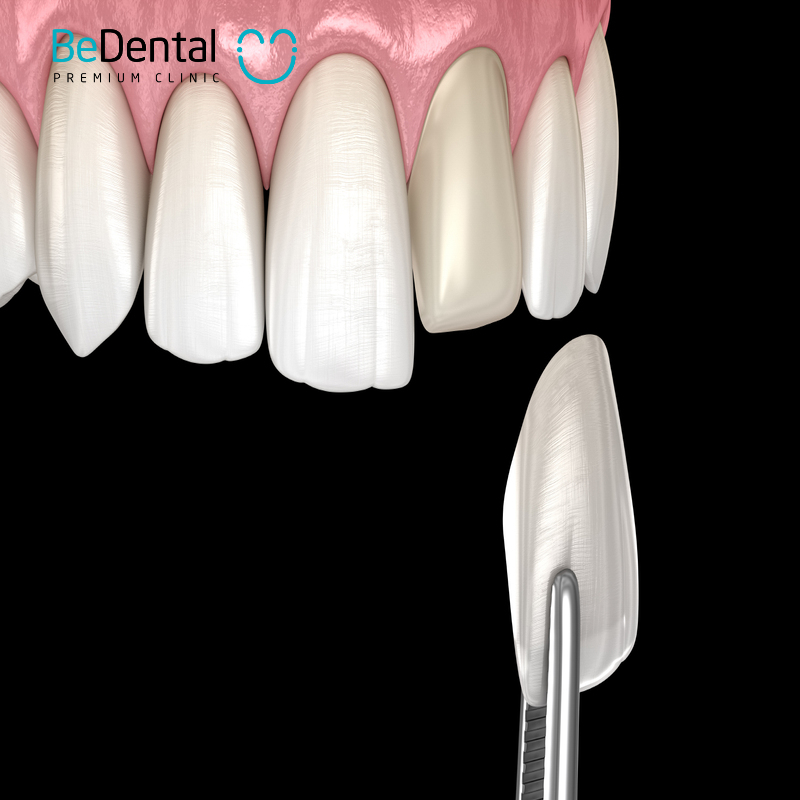According to statistics, about 50% of patients seeking cosmetic dental services have chosen veneers as a solution to enhance the beauty of their smiles. Veneers are designed as thin layers, typically made from porcelain or composite materials, to cover imperfections such as yellowed, cracked, or irregularly shaped teeth.
One of the frequently asked questions regarding veneers is, “Are veneers durable?” The average lifespan of porcelain veneers ranges from 10 to 15 years, while composite veneers can last from 5 to 7 years. However, how durable are veneers? The durability of veneers depends on several factors, including oral hygiene practices, the initial condition of the teeth, and individual dietary habits.
Introduction to Veneers: Purpose of Using Veneers in Cosmetic Dentistry
Dental veneers are thin layers made from materials like porcelain or composite, crafted to cover the front surface of teeth. Designed to enhance aesthetics, veneers are only about 0.5 mm to 1 mm thick, allowing for a natural-looking smile without sacrificing much of the tooth’s natural structure. The process of attaching veneers usually requires minimal intervention, helping to preserve more of the original tooth structure compared to traditional restorative methods.

Purpose of Using Veneers in Cosmetic Dentistry
Veneers are widely used in cosmetic dentistry for various purposes, including:
- Improving Dental Aesthetics: Veneers help conceal imperfections such as yellowed, cracked, or discolored teeth, providing a natural beauty to the smile.
- Shaping Teeth: Veneers can adjust the size and shape of teeth, helping to align gapped or overly small teeth.
- Minimally Invasive Solution: Veneers retain more of the natural tooth structure compared to dental crowns while enhancing aesthetics without significantly harming the real teeth.
- Protecting Teeth: Veneers also protect the tooth surfaces from external factors, minimizing the risk of cavities and damage.
Due to these benefits, veneers have become a popular choice for those looking to improve their smiles without undergoing complex procedures.
How durable are veneers? and Factors Affecting Their Longevity
How durable are veneers? The durability of veneers depends on the materials used and the care habits of the wearer.
Types of Veneer Materials
- Porcelain Veneers: These are the most common type of veneers in cosmetic dentistry, made from high-quality porcelain with superior durability and aesthetics. They are resistant to staining and color changes, providing a natural appearance and light-reflecting capabilities similar to natural teeth.
- Composite Veneers (What you need to know about composite veneers) Made from synthetic resin, composite veneers can be easily shaped to meet individual aesthetic needs. Although they are more cost-effective than porcelain veneers, composite veneers generally have a shorter lifespan and are prone to discoloration over time.
Average Lifespan- How durable are veneers?
Porcelain Veneers: With proper care, porcelain veneers can last from 10 to 15 years. They maintain their color and withstand chewing forces well, giving wearers peace of mind during daily meals.
Composite Veneers: Composite veneers usually have a shorter lifespan, ranging from 5 to 7 years. They can discolor or crack if not properly cared for, so users should pay attention to hygiene and maintenance.

Factors Affecting Durability- How durable are veneers?
Several factors can influence the longevity of veneers, including oral care practices, dietary habits, and the initial condition of the teeth.
- Oral Hygiene Practices: Regular and proper oral care is essential to maintaining the durability of veneers. Brushing at least twice a day and using dental floss to clean between teeth are necessary practices.
- Initial Oral Health Condition: Healthy teeth before applying veneers contribute to their longevity. If there are issues such as cavities or gum disease, treatment is needed before placing veneers.
- Dietary Habits: Eating habits also impact the durability of veneers. Foods that are too hard or chewy can put pressure on veneers, making them susceptible to cracks or breaks. Limiting sugary foods can also reduce the risk of cavities and keep veneers in good condition.
In summary, choosing the right type of veneer material and maintaining proper oral care is crucial for ensuring the durability and aesthetics of veneers over time.
Tips for Maintaining Veneers to Extend Their Lifespan
Here are some care recommendations for maintaining veneers, provided by BeDental:
Regular Oral Hygiene
Proper Brushing: To maintain the health of veneers, it is vital to brush at least twice a day. Using a soft-bristle toothbrush and a non-abrasive toothpaste can clean without damaging the veneers. Make sure to brush both the surfaces of the teeth and the areas between them to remove plaque.
Using Dental Floss: Flossing helps clean hard-to-reach areas between teeth and veneers. This not only keeps teeth and gums healthy but also protects veneers from plaque and decay.

Avoiding Harmful Foods
Limit Hard Foods: Hard foods such as nuts, hard candies, or any food that requires strong biting can exert great pressure on veneers, leading to cracks or breaks. It’s advisable to limit the consumption of these foods and choose softer options instead.
Avoid Strongly Colored Foods: Foods with strong colors, like curry, hot sauce, or red wine, can stain veneers over time. Limiting these foods or cleaning teeth immediately after consuming them can help minimize staining risks.
Regular Dental Check-ups
Check Veneer Condition (from Woodweb): Regular dental visits help detect any potential issues with veneers early on. The dentist will examine the condition of the veneers and recommend appropriate care measures.
Adjustments and Repairs When Necessary: If veneers become damaged or show signs of cracking, timely adjustments or repairs can help protect oral health and extend the lifespan of the veneers. Don’t hesitate to visit the dentist at the first sign of any problems.
In conclusion, maintaining proper oral hygiene, avoiding harmful foods, and scheduling regular dental check-ups are key factors in preserving veneers, thereby extending their lifespan and keeping the smile beautiful.
BeDental is a trusted name for dental veneers in Vietnam
BeDental is a trusted name for dental veneers in Vietnam. The clinic offers high-quality veneers that enhance the aesthetics of teeth, providing a natural and beautiful smile. With a team of experienced dental professionals, BeDental utilizes advanced technology and techniques to ensure precise and durable results. Patient care and satisfaction are top priorities, making BeDental a preferred choice for those seeking cosmetic dental solutions in the country.
For those seeking further consultation regarding dental examination services, please visit BeDental’s locations in Hanoi or Ho Chi Minh City. You can also reach us at our hotline: (+84) 934.61.9090 / (+84) 899.555.636 or through our Facebook page, BeDental, for prompt and accurate assistance.




